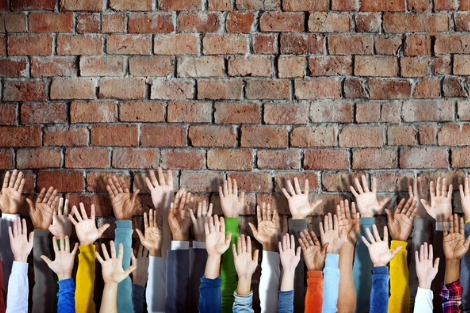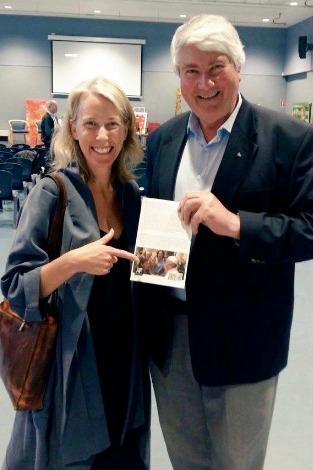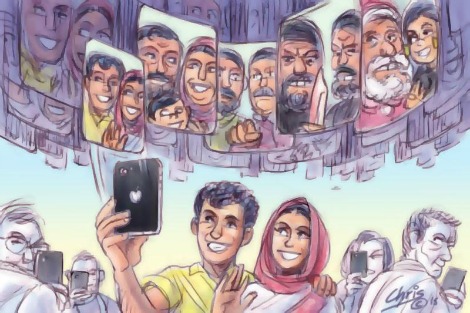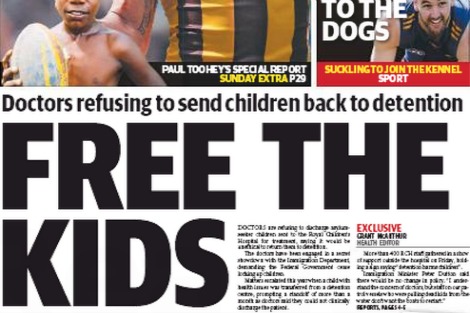Keywords: Transparency
There are more than 200 results, only the first 200 are displayed here.
-

RELIGION
- Frank Brennan
- 30 November 2015
6 Comments
'No one doubts the pastoral sensitivity of Pope Francis. But the Church will continue to suffer for as long as it does not engage in open, ongoing discussion and education about the issue of women's leadership. The official position is no longer comprehensible to most people of good will, and not even those at the very top of the hierarchy have a willingness or capacity to explain it.' - Fr Frank Brennan SJ outlines five challenges and opportunities for the Catholic Church in the 21st century.
READ MORE
-

AUSTRALIA
- Esther Anatolitis
- 26 November 2015
2 Comments
One of the few industries lacking a national advocacy platform, the arts, was stunned when a political move was made to undermine the key policy and investment body. The Australia Council is still reeling, and arts leaders from around the country are scrambling to save their organisations and support their colleagues following the Council's drastic cancellation of entire funding rounds. At stake here is the nature of Australian culture and the public experience of it, both now and into the future.
READ MORE 
-

AUSTRALIA
- Leanne O'Donnell
- 24 November 2015
7 Comments
In October last year, in my former role as regulatory manager of iiNet, I responded to a confidential industry consultation paper on the proposed data retention scheme. The Attorney-General's Department provided no response to that 22 page paper beyond an acknowledgment of receipt. It's frustrating to feel like a government is simply going through the motions of 'consultation'. This isn't an isolated case. There's too often a lack of meaningful consultation before bills are introduced into Parliament.
READ MORE 
-

ENVIRONMENT
- Frank Brennan
- 06 November 2015
1 Comment
Francis does not pretend to have answers to the big questions which will confront world leaders when they gather in Paris. But he does think the science is IN, and the evidence is clear that much of the climate change, loss of biodiversity and water shortages are the result of human action. We are blessed to have a pope who speaks to all the world about the prudence, justice and empathy required so that more people on our planet might enjoy integral human development.
READ MORE
-

AUSTRALIA
- Leanne O'Donnell
- 02 November 2015
9 Comments
In May, the Federal Justice Minister announced a plan to work toward a National Facial Biometric Matching Capability, due to start operating in mid-2016. The lead agency is the Attorney-General's Department, the same department frustrating telcos with its implementation of data retention. The lack of transparency around the project is concerning, as it has privacy implications for nearly all Australians. If you have a passport or driver's licence, your facial image is relevant.
READ MORE 
-

AUSTRALIA
- Frank Brennan
- 23 October 2015
4 Comments
Francis knows there are all sorts of issues inside and outside the Church where for too long people with power have tried to keep the lid on, in the hope that the problems and complexities will go away, often by parodying those who see the problems or complexities as small 'l' liberals or cafeteria Catholics. He delights in being joyful and troubled while contemplating big problems, calling people of good will to the table of deliberation reminding them of the kernel of the Christian gospels. He has the faith and hope needed to lift the lid without fear and without knowing the answers prior to the dialogue occurring.
READ MORE
-

AUSTRALIA
- Justin Glyn
- 13 October 2015
9 Comments
Health care professionals at the Royal Melbourne Children's Hospital have begun to do what could not be achieved by reports from the UN Special Rapporteur on Torture and Australia's Human Rights Commission. The doctors and staff are refusing to release children they treat back to the detention which caused their problems in the first place. By this brave act has begun the slow task of pouring daylight (always the best antiseptic) into this gaping wound in Australian society.
READ MORE 
-

- Frank Brennan
- 18 September 2015
Pope Francis's concerns are not narrowly dogmatic or pedagogical but universally pastoral. He knows that millions of people, including erstwhile Catholics, are now suspicious of or not helped by notions of tradition, authority, ritual and community when it comes to their own spiritual growth which is now more individual and eclectic. He wants to step beyond the Church's perceived lack of authenticity and its moral focus on individual matters, more often than not, sexual. He thinks the world is in a mess particularly with the state of the planet — climate change, loss of biodiversity and water shortages, but also with the oppression of the poor whose life basics are not assured by the operation of the free market, and with the clutter and violence of lives which are cheated the opportunity for interior peace. He is going to great pains to demystify his office. He wants all people of good will to emulate him and to be both joyful and troubled as they wrestle with the probl
READ MORE
-

- Frank Brennan
- 07 September 2015
11 Comments
I believe in Aylan's inviolable, inherent dignity as a human being like all of us, no matter what side of a national border we might live. I believe that a globe of 7.3 billion people with inviolable, inherent dignity confronts huge challenges and real evil when almost 60 million people are displaced. I believe that secure national borders for a country as geographically and jurisprudentially isolated as Australia confronts an enormous moral challenge, and that we are falling short, badly and selfishly.
READ MORE
-

AUSTRALIA
- Barry Gittins
- 04 September 2015
7 Comments
As Father's Day looms, I embrace zen introspection. My beloved Keeper and I have two offspring, a daughter — a sweetheart aged 12, turning 30 — and a son — boisterously nine. Life changed unrecognisably with their arrival, and overwhelmingly for the better. This Sunday I will join the ranks of sleepy paters, gingerly drinking dubious coffee, eyeing off culinary abominations and graciously acknowledging new socks.
READ MORE 
-

- Frank Brennan
- 01 September 2015
1 Comment
If you want to form government in Australia and if you want to lead the Australian people to be more generous, making more places available for refugees to resettle permanently in Australia, you first have to stop the boats. If you want to restore some equity to the means of choosing only some tens of thousands of refugees per annum for permanent residence in Australia from the tens of millions of people displaced in the world, you need to secure the borders. The untrendy truth is that not all asylum seekers have the right to enter Australia but that those who are in direct flight from persecution whether that be in Sri Lanka or Indonesia do, and that it is possible fairly readily (and even on the high seas) to draw a distinction between those in direct flight and those engaged in secondary movement understandably dissatisfied with the level of protection and the transparency of processing in transit countries such as Malaysia and Indonesia. The popular evil is that political
READ MORE
-

AUSTRALIA
- Fatima Measham
- 11 August 2015
12 Comments
Words like rorter, bludger and leaner only ever seem to apply to those who apply for welfare. A politician who draws down unreasonably on entitlements or a banker who earns stratospheric bonuses are seen as passive beneficiaries of the system. It seems the case that only those with power or capital are allowed to blame systems. The rest of us get to be individuals who make choices.
READ MORE 